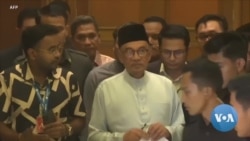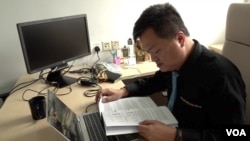“Take a bite,” Leo Lim tells his 3-year-old son, Jaye, while feeding him some bread for breakfast. Jaye’s twin sister, Cleona, sits next to him nibbling away.
The twins are loud, messy and everything else you would expect from 3-year-olds.
“It’s a lot of work, but I wouldn’t trade it for anything,” Lim, 46, said.
But the day-to-day living costs for Leo and his wife, Cassin, 39, have increased significantly. Leo said their food bill has gone up about 30% during the past year.
“So many of the things we buy have become so much more expensive,” he said.
The rising costs have forced this middle-class couple to cut unnecessary expenses such as going out for fun date nights with nice dinners.
“We are actually trying our best to just keep ourselves afloat,” Lim said.
They are not alone.
According to the Malaysia-based Education and Research Association for Consumers (ERA Consumer Malaysia), in the past three months, milk prices have increased 20%, some vegetables cost four to five times more, and, in the past six months, the price of pork has gone up by 25%.
“Increasing prices are making it tougher for everyone,” said Indrani Thuraisingham, secretary-general of ERA Consumer Malaysia.
The Lim family hopes the administration of Malaysia’s new Prime Minister Anwar Ibrahim, who was sworn in last month, can help lower food prices and kick-start the country’s pandemic-battered economy.
“They do have a lot of things to prove to the citizens, to the voters,” Leo Lim said.
In a statement last week, Anwar said that bulk subsidies should be channeled to lower and middle income groups as well as small traders.
Political science professor Wong Chin-Huat of Sunway University said dealing with the economy and cost-of-living issues is the top priority for Anwar — “the first yardstick [the public] is going to use to measure, to evaluate, this government.”
Wong said he expects the Anwar administration to provide targeted subsidies to the country’s poorest and income tax breaks for the middle-class. To cover the costs, Wong said the administration will likely reintroduce a goods and services tax that was abolished in 2018 but at a rate of 2% to 3% compared to the 6% it was previously.
“None of this will be enough to make people feel that life is very good,” he said. “But what is important is that they feel the government is with them, the government knows what to do.”
On top of the economy, Anwar's administration is already dealing with emergencies. Last week a landslide at an illegal camp site led to the deaths of more than 20-people. The administration might soon have to deal with large-scale natural disasters. The country is now in the monsoon season, and there are concerns about a repeat of the situation from almost a year ago when heavy flooding killed more than 50 people, displaced more than 120,000 and caused almost $1.5 billion in losses.
While flooding during the monsoon season is common along the eastern coast of the Malaysian peninsula, flooding nearly a year ago also hit many urban areas hard in the country’s west.
“It seemed like the last administration was caught flat-footed when the flooding happened a year ago,” said Charles Tan, a carpenter from Kuala Lumpur. “The response was inadequate, and many victims didn’t get help quickly enough.”
Wong said Anwar’s administration will need to rise to the challenges that any natural disasters bring.
“If there’s going to be another massive flood like what we have seen last year’s end, Anwar’s government is expected to deal with it swiftly, effectively and to provide emergency response and relief to those who need it,” Wong said. “If he fails to do so, all the claims of his government’s competence would be questioned severely.








